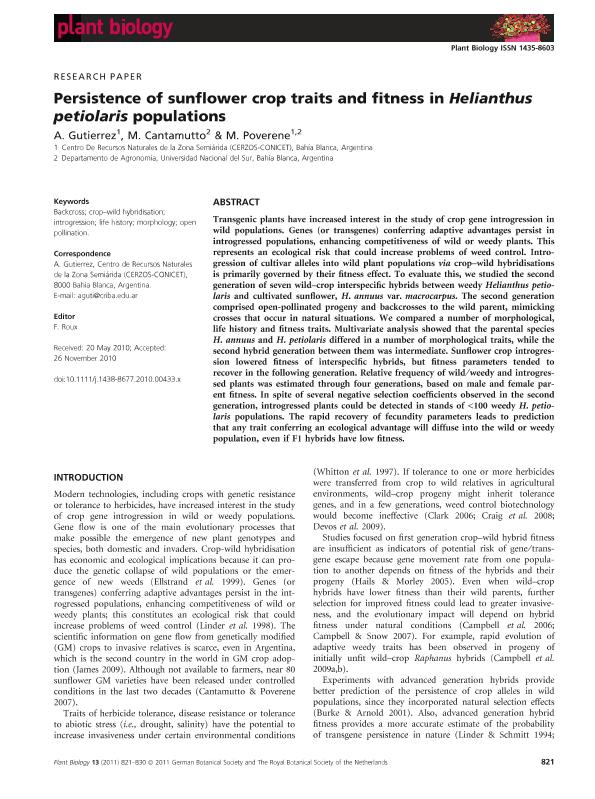Artículo
Persistence of sunflower crop traits and fitness in Helianthus petiolaris populations
Fecha de publicación:
09/2011
Editorial:
Wiley Blackwell Publishing, Inc
Revista:
Plant Biology
ISSN:
1435-8603
Idioma:
Inglés
Tipo de recurso:
Artículo publicado
Clasificación temática:
Resumen
Transgenic plants have increased interest in the study of crop gene introgression in wild populations. Genes (or transgenes) conferring adaptive advantages persist in introgressed populations, enhancing competitiveness of wild or weedy plants. This represents an ecological risk that could increase problems of weed control. Introgression of cultivar alleles into wild plant populations via crop–wild hybridisations is primarily governed by their fitness effect. To evaluate this, we studied the second generation of seven wild–crop interspecific hybrids between weedy Helianthus petiolaris and cultivated sunflower, H. annuus var. macrocarpus. The second generation comprised open-pollinated progeny and backcrosses to the wild parent, mimicking crosses that occur in natural situations. We compared a number of morphological, life history and fitness traits. Multivariate analysis showed that the parental species H. annuus and H. petiolaris differed in a number of morphological traits, while the second hybrid generation between them was intermediate. Sunflower crop introgression lowered fitness of interspecific hybrids, but fitness parameters tended to recover in the following generation. Relative frequency of wild ⁄weedy and introgressed plants was estimated through four generations, based on male and female parent fitness. In spite of several negative selection coefficients observed in the second generation, introgressed plants could be detected in stands of <100 weedy H. petiolaris populations. The rapid recovery of fecundity parameters leads to prediction that any trait conferring an ecological advantage will diffuse into the wild or weedy population, even if F1 hybrids have low fitness.
Archivos asociados
Licencia
Identificadores
Colecciones
Articulos(CERZOS)
Articulos de CENTRO REC.NAT.RENOVABLES DE ZONA SEMIARIDA(I)
Articulos de CENTRO REC.NAT.RENOVABLES DE ZONA SEMIARIDA(I)
Citación
Gutierrez, Agustina; Cantamutto, Miguel Angel; Poverene, Maria Monica; Persistence of sunflower crop traits and fitness in Helianthus petiolaris populations; Wiley Blackwell Publishing, Inc; Plant Biology; 13; 5; 9-2011; 821-830
Compartir
Altmétricas




